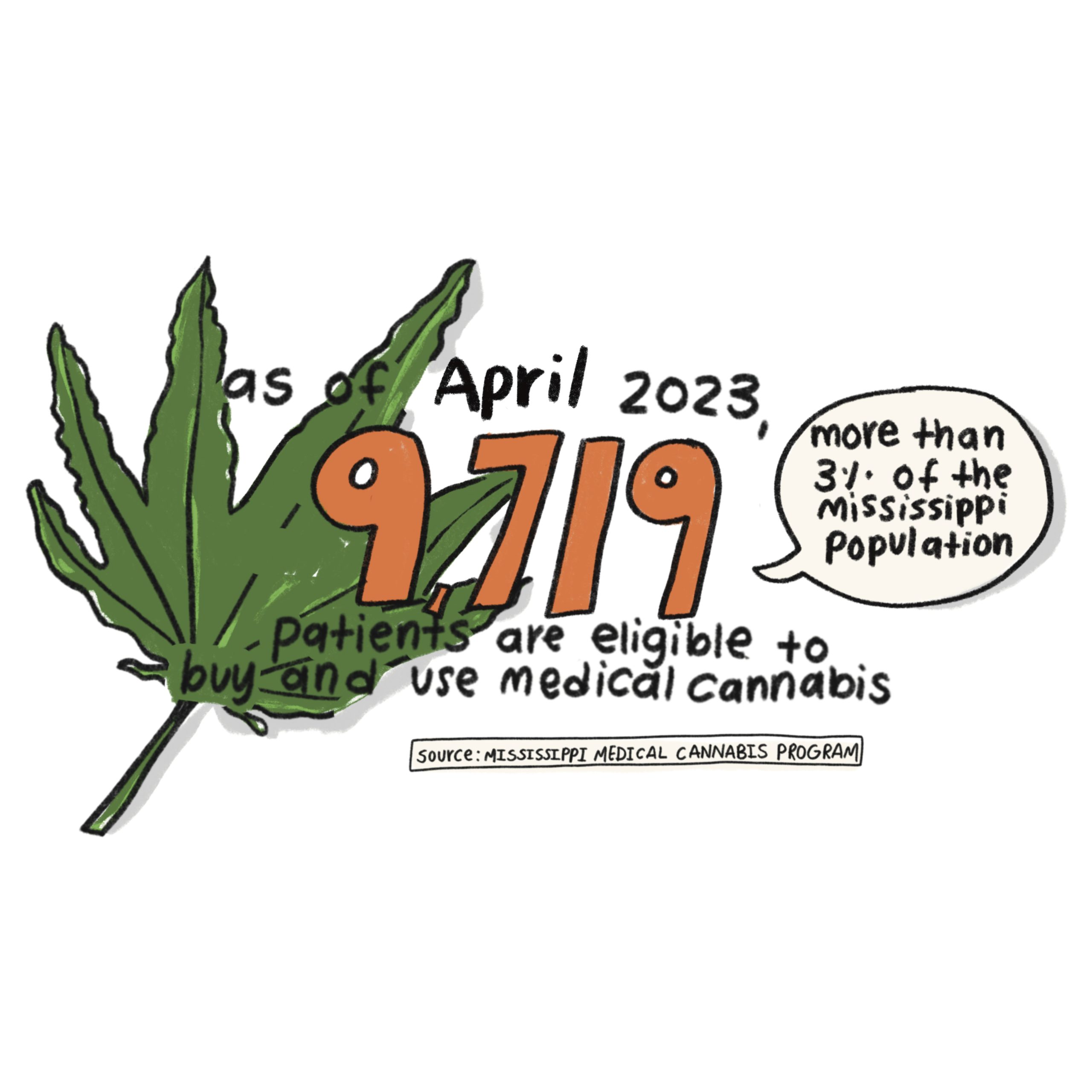
People with depression and anxiety have self-medicated with cannabis long before it was made medically legal in many states.
In a 2022 study published in the International Journal of Environmental Research and Public Health, a survey of 290 young adults showed that 76% endorsed self-medicating their mental health issues, namely anxiety, with cannabis. The National Institute of Mental Health cites a 2021-23 study estimating that more than 19% of American adults had some form of an anxiety disorder in the past year, and more than 31% experience one in their lifetimes.
While the majority of states that have legalized medical cannabis include at least one mental health issue as a qualifying condition, it is typically PTSD, or post-traumatic stress disorder.
New Jersey is the only state to specifically recognize anxiety as a qualifying condition.
Mississippi’s only mental health conditions approved for a prescription are PTSD, the agitation of dementia, Alzheimer’s and Autism.
States that have additional mental health conditions include Alabama (panic disorder), Michigan (obsessive-compulsive disorder) and Missouri (debilitating psychiatric disorders).
Eight states – California, Delaware, Louisiana, Maine, Massachusetts, Missouri, Oklahoma and Virginia – leave it up to the prescribing physician to determine what constitutes a qualifying condition.
National mental health organizations have a wide range of attitudes toward the potential benefits of medical cannabis.
The American Psychological Association cited a Penn State study using cannabis from the University of Mississippi, one of the largest and longest running trials of cannabis and PTSD, as suggesting positive outcomes from use.
The study, published in 2021, showed a significant decrease in symptoms for those with PTSD, although the results were negligible in relation to the placebo by Stage 1. Though patients using cannabis reported a decrease in their symptoms, a comparable amount of patients who unknowingly received a placebo reported a decrease in symptoms as well.
Other organizations, though, cite studies pointing to negative effects that warrant caution for cannabis use.
The Substance Abuse and Mental Health Services Administration says there is a link between cannabis use and depression, anxiety, suicidal tendencies and psychosis, although they are unsure if this is correlation or causation.
The Centers for Disease Control and Prevention points to concerns about the impact of cannabis on memory, attention, learning and motor skills; this concern is much greater for developing brains, which are those under age 25.
Practitioner Perspective
While national organizations are on the fence, some practitioners are much more emphatic in their warnings against cannabis use.

Erica Komisar, a clinical social worker and psychoanalyst, says that the THC content in cannabis has grown exponentially over the past 50 years and can cause severe side effects. There are many theories as to why THC content has increased, but many point to the assertion that prohibition increases potency, which leads those who have self-medicated illicitly to seek higher THC content.
Due to the previously lower THC content, the CDC did not recognize physical addiction as an aspect of cannabis use, instead only an emotional one. Now, due to rising THC, there is a physical addiction component, according to the CDC, which poses a threat to those using cannabis.
Komisar, who has contributed to The Washington Post, Huffington Post and The Wall Street Journal, is especially worried about the effect legalizing medical cannabis may have on adolescents. In an opinion piece for The Wall Street Journal, titled “Legal Weed Feeds the Teen Mental Health Crisis,” she argued that legalizing cannabis, even for medicinal use, creates a slippery slope; the use of cannabis being normalized might lead to poor brain development in adolescents who partake for either medical or recreational reasons.
“Adolescent brains are in a critical period of development, which means that the damage that it does to their brain when they’re under the age of 25 is much greater,” she said during a recent phone interview. “Some of it is irreparable.”
This damage includes anxiety and depression as well as bouts of psychosis. It may also manifest as depersonalization or derealization, or the feelings that you or the world around you is not necessarily real.
Komisar rejects the suggestion that raising the minimum age and restricting THC content might help prevent these issues. “That ship has sailed … and when we legalize something, we’re actually legitimizing it as not being dangerous.”
She warns that if someone were to experience depersonalization or derealization, it could take years to overcome, if ever. She has seen cases in which this loss of touch with reality, or even results of full-blown psychosis, can make people suicidal, which especially worries her.
She believes that if cannabis is used, it should only be for end-of-life medical issues.
“The only thing that I can see medical cannabis use for is cancer. … I worked in oncology, and it helps with nausea. It helps with nausea when you have cancer. … This idea that it’s used for mental health conditions — no, absolutely not.”
In terms of mental health treatment, Komisar believes psychotherapy is the key for people to overcome their mental health disorders. While she does think there is a purpose for SSRIs, commonly referred to as antidepressants, and benzodiazepines, she stipulates that it is only in the worst case scenario, such as when someone is suicidal and they are simultaneously in therapy.
The Mississippi Approach
Mississippi’s evolving medical cannabis program, which launched in late 2022, has never included anxiety as a qualifying condition.While the state has been making adjustments to its program, striving to overcome initial hangups in application processes and regulations on business models, the list of 25 qualifying conditions has remained unchanged.

According to Keevia Porter, a nurse practitioner and assistant professor at the University of Tennessee Health Science Center, medical cannabis provides reliable short-term relief to those who are suffering from PTSD episodes. Porter also runs Zyn Healthcare in Oxford, Mississippi.
“Most times PTSD is treated with the same medicine that we treat anxiety, which are antidepressants,” said Porter. “Antidepressants work well both for anxiety as well as depression. That’s because the neurotransmitter imbalances are about the same causes.”
The main issues that plague PTSD patients are panic and ruminating thoughts, often related to the incident or incidents that incited the disorder. Though cannabis does not cure PTSD, it serves to relieve patients from their fight-or-flight response activating during triggers. This can lead to a better quality of life for those struggling with symptom management.
As long as a patient responds well and does not have a history that indicates a predisposition to known side effects, such as derealization, hallucinations or episodes of psychosis, she believes that medical cannabis is a viable treatment option for qualifying anxiety disorders. She still recommends patients seek psychotherapy on top of their cannabis prescription, particularly those with PTSD, whom she recommends for trauma-based psychotherapy.
“The only time I discourage the use of it is if a person has a mental health disorder that causes psychosis, (like schizophrenia),” Porter said. “I tell them, if it makes you hallucinate more or increases your psychosis, then I recommend you not use it.”
Studies have shown cannabis efficacy in treating PTSD; a study from Wayne State University found that THC’s function in the amygdala, which is a vital part of the brain’s development of memories and emotional responses, can regulate threat processing.
One example Porter offers is patients who have developed PTSD from sexual assault. Often, these patients struggle to interact with those who remind them of their abuser – typically men. Her patients can use cannabis before a known interaction with men will occur, and this will dull their otherwise immediate reaction of anxiety.
As for its role in treating other anxiety disorders, such as generalized anxiety disorder, more research is needed. There are contradictory findings, such as between large-scale surveys and clinical trials.
Patient Preference
Two Mississippi patients who use or have used cannabis to treat PTSD agreed that it alleviated their symptoms and was their preferred method of treatment. Both wished to remain anonymous due to the stigma surrounding cannabis.
One patient, J, said he had wanted to get off Valium and Xanax, which his psychiatrist would flip between for his prescriptions. Both are benzodiazepines, and their strong potential for abuse worried him as he has a family history of addiction. Further, they can cause side effects both when on the medications and when in withdrawal, some of which are potentially fatal.
Though J told his psychiatrist he did not like the feeling of taking these medications, and that he was worried about long-term effects, his psychiatrist was still a roadblock in getting a state-approved medical card for cannabis.
“It’s really upsetting to me that I trusted this person with my mental health and then when I wanted off of the Valiums, he didn’t want to help me do that,” he said.
He had to switch doctors to one who would prescribe medical cannabis.
“In terms of patients … I think that they’d need to take another look at the qualifying conditions. Anxiety disorders are just as important as people like me (with PTSD), because I have anxiety disorders, too, and PTSD night terrors.” He went on to include that “anxiety disorders, insomnia, sleep disorders, I think those things need to be addressed with plants versus medication.”
Another patient, B, used cannabis while living in Colorado due to PTSD developed from his time in the military. However, he does not currently have a prescription for PTSD in Mississippi; due to a debilitating car accident in Colorado that forced him to move back home, he has a cannabis prescription for chronic pain instead.
“I think they should just go to a model where the doctor can recommend cannabis for whatever (seems appropriate),” he said.“So, it should be between you and your doctor, not the state … tell(ing) you, okay, you can only get it for these things.”


























